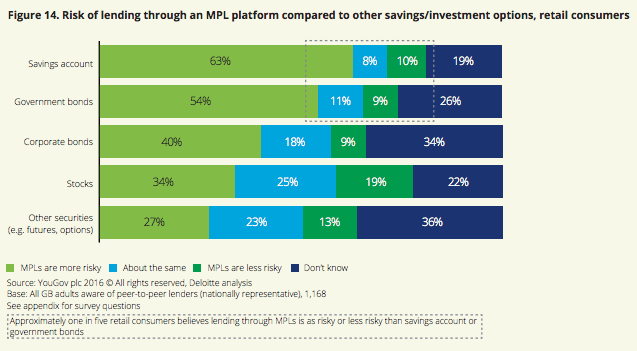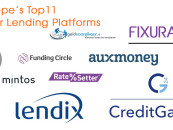
P2P Lending Won’t Displace Banks; Dealing with Credit Risk Management
by Fintechnews Switzerland October 25, 2016Peer-to-peer lending, which aims at shaking up the banking market and attacking one of the core profit-generating activities of banks, is not likely to displace banks from their core roles of lending to retail consumers, according to a report by Deloitte.
Peer-to-peer (P2P) lending, also referred to as marketplace lending, leverages digital platforms and modern technology to cut out the middle man and provide better rates of interest to lenders and borrowers.
Despite the promising outlook, the P2P lending industry has recently come under fire as Renaud Laplanche, CEO of Lending Club, one of the leading platforms in the US, was forced to resigned after the company revealed that it had provided mis-assessed loans to Jefferies and Co., which was distributing the loans to institutional investors, reports the Wall Street Daily.
The news was followed shortly by a report released by the US Treasury that warned about peer-to-peer lending businesses, recommending it to be more tightly regulated.
The skepticism over P2P lending has also been felt in China where loan sharks have been widely criticized for practicing aggressive debt recovery tactics, demanding for instance nude photos as collateral from female borrowers for blackmail if they fall behind on their repayments, reports the Financial Times. Other disturbing debt recovery tactics in China include property destruction and bodily injury.
Bankruptcy lawyer Han Chuanhua of the Zhongzi Law Offices in Beijing, told the media outlet:
“If they borrow from banks there is no threat to personal safety. But if they borrowed from private lenders, especially high-interest lenders, it can happen. […] If they can’t repay sometimes the high-interest lender sends people to their homes. Mostly they threaten, but sometimes they take action. These types of people don’t go through legal channels.”
While P2P lending has enabled the masses to gain access to credit and investment opportunities in China, the sector has nevertheless a Wild West aspect with lenders reportedly peeking in bathrooms in order to assess credit risks and borrowers settling payment obligations with bottles of spirits.
Despite the struggles, the industry continues its path to maturation with notable initiatives emerging to structure and legitimize the practice. For instance, the Marketplace Lending Association, launched in April with the purpose of promoting responsible business practices and sound policy to benefit borrowers and investors.
A similar organism exists in Switzerland called the Swiss Crowdfunding Association and counts among its members the likes of Advanon, Cashare, Lend, Swisspeers, WeCan.Fund, Crowdhouse and CreditGate24.
Launched in March 2015, CreditGate24 connects borrowers directly with private and institutional investors. During its first year of operation, CreditGate24 enabled more than 270 credit projects without any failure.
The company performs strict credit checks based on traditional methods with use of Big Data analytics.
Yet, P2P lending remains a risky bet compared to other savings and investment options, according to Deloitte. However, it highly depends on the market. Switzerland seems to be a very attractive destination. The country is known to be very reliable and strict in credit-Risk Management and investors can get attractive yields with the likes of CreditGate24 and others.

Featured image: Hand shake by Bplanet, via Shutterstock.com.





